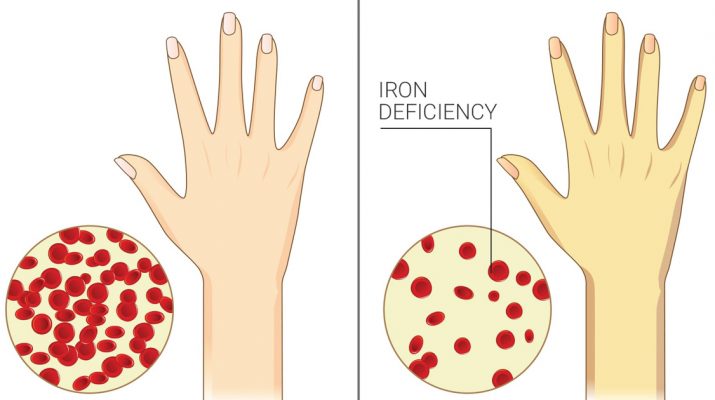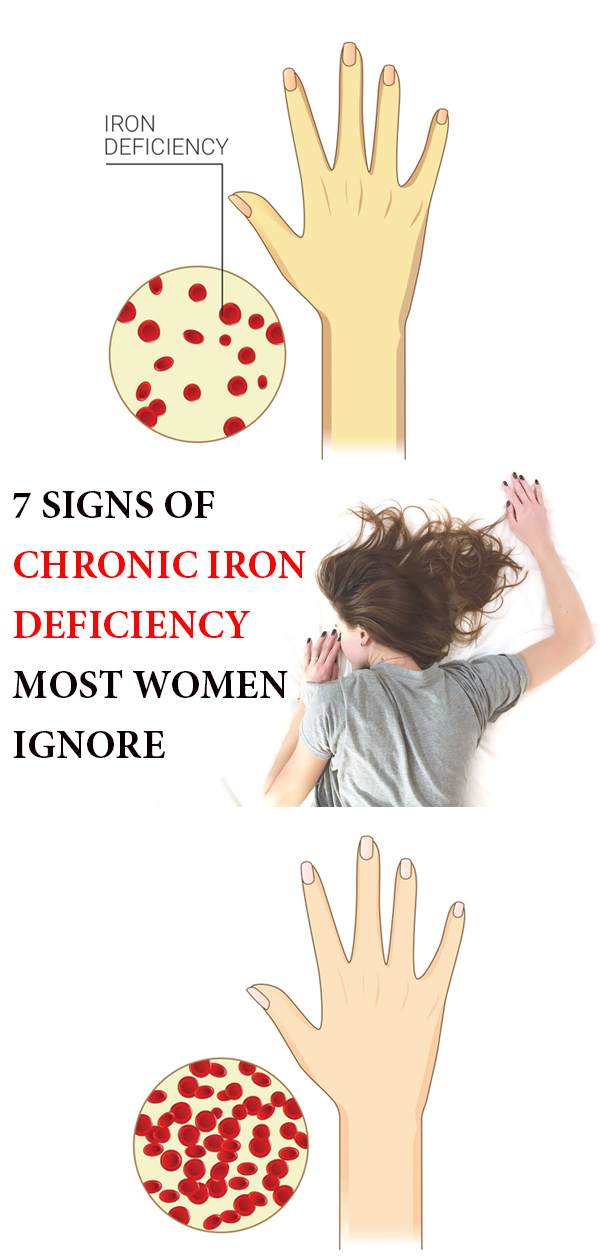Iron plays an important role in the body. It helps in the production of a component in the blood called hemoglobin, or the proteins found in the red blood cells, that carries the oxygen to different organs. An iron deficiency limits the hemoglobin your body greatly needs so you could become anemic or have a low count of healthy, oxygen-carrying red blood cells.
Women are more at risk for iron deficiency because of menstruation. It is, therefore, important for women to get at least 18 mg of iron every day, according to the National Institutes of Health. But a pregnant woman needs twice the amount. Her body needs to increase the level of hemoglobin since it’s also nourishing the baby.
Unfortunately, iron deficiency is often ignored and under-diagnosed. Below are some signs that may give clues that you’re lacking in iron.
Here Are 7 Signs Of Chronic Iron Deficiency Most Women Ignore
1. You Are Always Exhausted And Fatigued
The most common symptom of iron deficiency is when you’re feeling tired, weak, and fatigued most of the time. This is your body’s way of telling you that it’s not receiving enough oxygen so your energy levels are easily depleted.
Women who have their period often complain of feeling sluggish and lazy. Although some aspects of this exist as a normal part of their monthly cycle, what they really need is to eat more iron-rich foods. An alternative is to take an iron supplement to avoid having no energy to get up in the morning.
Exhaustion and fatigue are also common if you have a busy and frenetic schedule. If you’ve got a lot of things going on, you might not likely think you suffer from iron deficiency when you crash on our bed at night after a long and hard day at work. But if you’ve been having many episodes of weakness, along with crankiness and poor concentration, get properly assessed by a doctor for iron deficiency.
2. You’re More Prone To Developing Infections
Are you always the first one to get a cold during flu season? Do you easily catch an infection? When your body lacks iron, your immune system can’t function optimally.
- When you have a low count of healthy red blood cells, your body has a harder time transporting oxygen to the spleen. This is the organ that helps your body fight off infections as it filters the blood that goes through your veins.
- You also have a low count of white blood cells when you’re iron deficient. When your body doesn’t produce enough of these, you grow more susceptible to virus and bacterial infections.
If you have an iron deficiency, your body will not just have a hard time resisting infection; you might get sick longer and more intense than most people once you do catch a cold or flu. The positive thing is you can easily reverse iron deficiency and make your immune system stronger. Simply take supplements and eat the right types of food.
3. You Have Hair Loss
Hair loss can be hereditary but it may also be due to the lack of nutrients, specifically iron. Cells that need to stimulate hair growth can’t do their job when your body lacks hemoglobin. As a result, you may develop a condition involving hair loss. Studies have shown the links of iron deficiency in common hair loss problems like androgenetic alopecia, alopecia areata, or telogen effluvium.
Some signs that your hair may not be receiving enough nutrients include:
- More hair accumulating in the shower drain when you’re taking a bath
- More strands of hair filling up your brush than usual
- Unusual falling hair whenever you’re grooming
- Receding hairline
- Bald spots
- Thinning hair
- Dry and damaged hair
- Weak hair strands
Get an assessment from a doctor who will likely order a blood test to determine your iron levels. The good thing is hair loss due to iron deficiency is not permanent. You can regrow your hair and bring its natural glory back when you take iron supplements, improve your diet, and use doctor-recommended hair loss treatments.
For women, it might help to get your hair cut shorter while you’re taking treatments and still reviving your hair’s health. It will be more challenging to take good care of your hair if it’s longer. If necessary nutrients can’t reach the roots, your long hair will look limp and develop split ends.
4. You Have Headaches Or Dizziness
Do you find yourself popping a headache pill on a regular basis? You might chalk this up to using gadgets too much, which could be affecting your eyesight. Or, you might think you’re getting tension headaches from the stress of the daily grind. It’s also possible that you’re actually iron deficient.
While there may be other causes of a headache, frequent and recurrent ones usually indicate iron deficiency. More so if your headache is accompanied by feelings of lightheadedness or dizziness.
Again, the lack of hemoglobin causes those kinds of headaches. When your body can’t properly distribute the oxygen required for proper functioning, blood vessels swell and cause pressure. This is why you feel your head throbbing when you have a headache due to iron deficiency.
Some women who experience severe headaches and migraines when they have a period think that this is hormone related. A menstrual migraine may also be due to the menstrual blood loss so it might help to take iron supplements during that time of the month.
5. You Have Restless Leg Syndrome.
Restless leg syndrome brings an uncomfortable sensation that may temporarily limit your movement. This feels like a strange discomfort or crawling feeling on your legs. Your feet and muscles might throb, tingle, or itch.
This condition may commonly take place when you’ve been sitting in one position for an extended period. Some people develop restless leg syndrome at night, which could disrupt their sleep.
Restless leg syndrome commonly occurs on just one side but it’s common for people with iron deficiency to feel the sensations on both sides. Research showed that at least 25 percent of people suffering from anemia or an iron deficiency have restless leg syndrome.
- The lower your iron level gets, the more you feel the intensity and frequency of the symptoms.
- It won’t just be irritating and uncomfortable because sometimes restless leg syndrome can be accompanied by pain.
- As much as it might be difficult, you need to move your legs to lessen the sensations.
- You will also have to take iron supplements or eat foods rich in iron to reduce the occurrence of restless leg syndrome.
6. You Develop Cravings For Pica
Pica is any non-food substance like ice, cornstarch, toothpaste, clay, chalk, or dirt. As strange as this may sound, pregnant women have been documented to have these cravings because they have low iron levels.
Experts haven’t exactly pinpointed a direct link to these cravings and iron. Some theorized it’s not so much the taste but the sensation of the non-food item in the mouth that seems to satisfy the cravings.
Aside from ice, you obviously can’t eat these non-food substances just to satisfy your cravings. They might upset your stomach or poison your system. Get yourself checked for iron deficiency if you experience these cravings. If you’re already pregnant, tell your doctor that you’re having unusual cravings so that your iron levels can be monitored.
Pica cravings are also common among children with iron deficiency. At least 4 to 25 percent of patients in institutionalized facilities also have pica cravings, likely due to lack of iron.
7. You Look Pale
It’s one thing to be fair-skinned but if your skin looks very white and pale, it could be because your body isn’t producing enough hemoglobin. This protein element gives blood that vibrant red color. If your blood doesn’t look red enough, your hemoglobin count might be low; you can easily determine this by getting a blood test.
Your skin will show if you have a positive and healthy level of hemoglobin. You’ll have rosy cheeks on your face, a healthy color all over your body, and a kind of glow if you have a good iron supply in your system.
But the paleness isn’t just limited to your skin if you are iron deficient. You may also have pale gums, lips, and lower eyelids. The skin under and around your nails may also look whiter than normal. Doctors, in fact, can easily determine if you are anemic just by looking at your face, and checking your eyelids, fingers, and gums.
Final Thoughts On Signs Of Chronic Iron Deficiency That Most Women Ignore
If you suspect that you are iron deficient, do not delay a visit to the doctor to get proper treatment. While it’s not a life-threatening condition, you must still aim to get your hemoglobin count back in the normal level, as well as help your body replenish its iron supply, because a lot of organs count on iron to function well.
In some cases, it might not be necessary to take iron supplements, especially if you make a conscious effort to add iron to your diet. Some examples of foods rich in iron include:
- Dark green and leafy vegetables like spinach or kale
- Raisins, apricots, and other dried fruits
- Red meat, poultry, and pork
- Pulses like peas and beans
- Seeds and nuts
- Seafood
Sometimes, however, even if you eat plenty of iron-rich foods, your body might have a hard time absorbing this nutrient. Try eating foods rich in vitamin C because this can help enhance body absorption.
You need to get the recommended daily allowance (RDA) for iron but you also must not exceed this RDA because there’s also such a thing as iron overload or toxicity. Iron deposits can get lodged in your liver and other organs if you consume too much of this nutrient. This, in turn, may lead to liver damage and other conditions like heart disease or diabetes.
So, if you’ve been eating iron-rich foods but you think you need to have supplements, always ask your doctor for a recommendation first. This way, you minimize your risk of getting sick from too much iron. As with any diet, follow the most important rule for positive health: everything in moderation.


